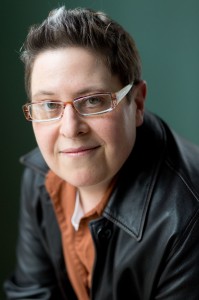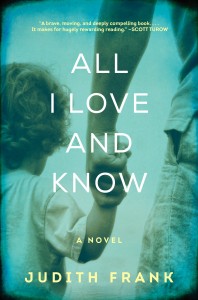INTERVIEW WITH JUDITH FRANK, AUTHOR OF ALL I LOVE AND KNOW
7/4/14 – INTERVIEW WITH JUDITH FRANK, AUTHOR OF ALL I LOVE AND KNOW

Ever since she sat beside me in 11th grade English class, I suspected that Judith Frank had something to tell the world – and the writing chops to tell it. Over the years Judy confirmed my suspicions repeatedly, winning prizes for her poignant poetry even back in high school and going on to become an author of both scholarly works and prize-winning fiction. If I had any lingering doubt, her new novel All I Love and Know, has shattered it.
Notable not only for its literary craft and emotional power but for its exploration of several hot-button social and political issues including gay marriage and the Israeli/Palestine conflict, All I Love and Know tells the story of partners Daniel Rosen and Matthew Green, whose quiet domesticity in Northampton, MA comes undone when Daniel’s twin brother and his wife are killed in a Jerusalem cafe bombing, leaving Daniel and Matt to raise their two young children. Custody conflicts not only intensify tensions with both sets of grandparents but threaten Daniel and Matthew’s relationship, as well as each man’s sense of self. Judy was kind enough to respond to some of the many questions and reflections this artfully provocative novel inspired in me. Here’s what she had to say:
TZ: Your first novel, Crybaby Butch, was published by Firebrand Press, a relatively small feminist and lesbian publishing house. Ten years later, All I Love and Know, is getting the royal treatment from a major commercial publisher. Do you think there’s anything fundamentally different in these two books in terms of either commercial appeal and/or style that explains their different publishing homes?
JF: What’s different, I believe, is that Crybaby Butch was about lesbians and All I Love and Know is about gay men. I decided to write about men because novels about lesbians count as super-specialized from a marketing standpoint, whereas gay men are at least men, so a novel about them counts as regular old literature. It’s the same way that “women’s fiction” is marketed for a niche readership, while “men’s fiction” – oh wait, there’s no such thing as “men’s fiction,” that’s called “fiction.” (That much said, the commercial choice quickly became an artistic one.)
TZ: For good or for bad, the Internet never lets us escape our pasts – and one of the things I learned from a little Google searching was that your original title for an earlier version of this novel was Noah’s Ark. Was the title change your idea? The publisher’s? And how important do you think a title is to the reading of a book?
JF: Changing the title was my editor’s idea, and it took us a long time to find it. I loved Noah’s Ark because it took up the Bible story and queered it: the journey from catastrophe to salvation, the couple (two-by-two) both being men. The kids had a Noah’s Ark set that the adults kept stepping on and that Matt had a lot of ironic commentary about. But my editor David Highfill felt it was wasn’t an inviting title, it was too Old Testamenty, and I had come to trust his instincts.
TZ: As I read All I Love and Know, I kept thinking that this was a story that only you could tell and that it also must have been painful for you to write, given the many ways the lives of the characters seemed to touch and morph on fundamental aspects of your own. But then I also remembered you once quoting one of your MFA teachers about all good fiction coming from this kind of personal pain, and soul-baring (the exact phrasing was more graphic). Were any parts of this novel particularly painful for you to write?
JF: The most painful part was, when creating Daniel, having to dig deep and imagine what it would be like if my twin sister Paula died in a terrorist attack. Imagining that horror and loss took a lot out of me.
TZ: One of the novel’s less trumpeted – but, to me, particularly resonant – motifs involves reconciling the desire to be accepted with a pride in being distinct and “other.” You touch on this not only with respect to the gay experience (up to the wedding/non-wedding at the end) but also with respect to Daniel’s choice to differentiate himself by alloting traditional honors and dreams to his twin brother, Gal’s need to fit in but also receive special recognition, locales where characters hope both to belong but also diverge from the mainstream (Jewish summer camp, Northampton, Jerusalem), and perhaps even the Israeli self-image, particularly in relation to Palestine. Was this a motif that you intended to build into the novel?
JF: That’s a great question. I don’t know if I consciously intended to build it in, but it is true that, like many gay people, I struggle with that tension a lot. That marriage became the biggest arena for gay rights in the 20th-21st centuries is regarded with skepticism by many who believe that our goal shouldn’t be to be like everybody else, but rather to subvert the dominant order. Matt is a voice of that skepticism in the novel: when he reads the book Gay Dads, where the dads say things like “We’re just a boring normal family,” he wants to stick a knife in his eye.
TZ: Your abilities as a creative writing teacher and critic are widely praised, and I speak from personal experience when I say quite deservedly so. Of all the advice and guidelines you’ve given over the years, which did you find most difficult to follow yourself in writing All I Love and Know?
JF: Aw, Terra, you’re the best. Believe it or not, I almost always follow the advice I give my students – probably because most of it comes from my own experience. I’m not a big fan of free-writing, which I have them do all the time because theoretically I believe in its capacity to push past the censor in all of us. But I do keep a journal where I do a kind of meta-writing to work out problems (“Wow, I’m sure having trouble with this scene! It’s so inert! What’s its problem? Do I need it?”).
Judith Frank is a professor of English at Amherst College. She holds a BA from the Hebrew University in Jerusalem and an MFA in creative writing and PhD in English from Cornell University. She received a fellowship from the National Endowment for the Arts for All I Love and Know (William Morrow, 2014) and has had residencies at Yaddo and the MacDowell Colony. Her previous novel, Crybaby Butch won a Lambda Literary Award in 2005.
Terra Ziporyn
TERRA ZIPORYN is an award-winning novelist, playwright, and science writer whose numerous popular health and medical publications include The New Harvard Guide to Women’s Health, Nameless Diseases, and Alternative Medicine for Dummies. Her novels include Do Not Go Gentle, The Bliss of Solitude, and Time’s Fool, which in 2008 was awarded first prize for historical fiction by the Maryland Writers Association. Terra has participated in both the Bread Loaf Writers Conference and the Old Chatham Writers Conference and for many years was a member of Theatre Building Chicago’s Writers Workshop (New Tuners). A former associate editor of the Journal of the American Medical Association (JAMA), she has a PhD in the history of science and medicine from the University of Chicago and a BA in both history and biology from Yale University, where she also studied playwriting with Ted Tally. Her latest novel, Permanent Makeup, is available in paperback and as a Kindle Select Book.
- Web |
- More Posts(106)